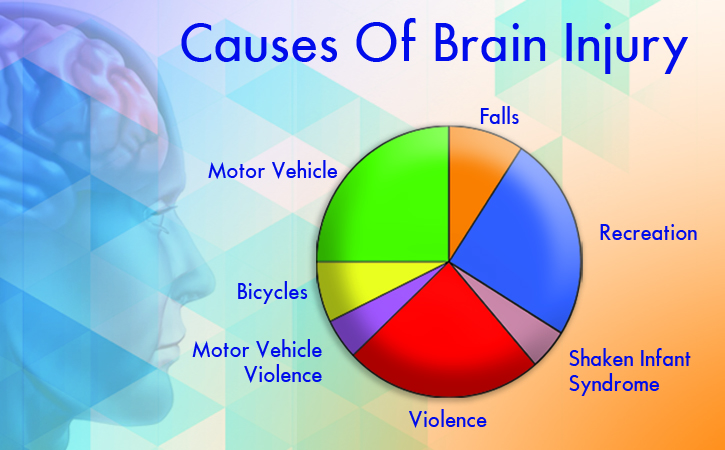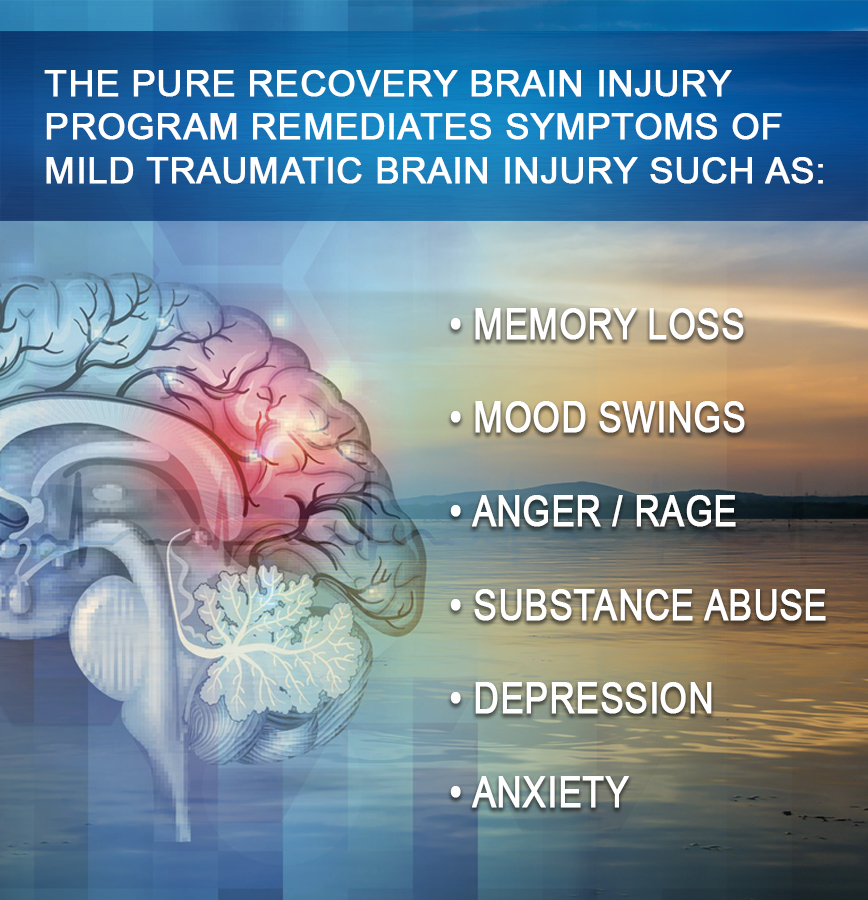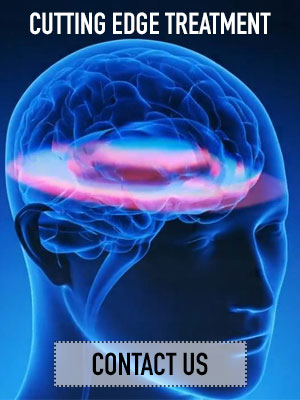
Brain Injury TBI and Addiction

Understanding the Link Between Traumatic Brain Injury (TBI) and Addiction
At Pure Recovery luxury rehab center, we recognize the intricate connections between Traumatic Brain Injury (TBI) and addiction to drugs or alcohol, particularly prevalent in high-stress communities. True healing begins only when both conditions are accurately diagnosed and treated, considering each client’s unique needs.
If you don’t treat the brain, the cravings and impulses won’t go away! This understanding is crucial, as it is common for individuals to undergo treatment multiple times without success if the underlying brain injury is not addressed.
Each year in the United States, 1.7 million people (about twice the population of Delaware) sustain a traumatic brain injury, according to the Substance Abuse and Mental Health Services Administration (SAMHSA). Unfortunately, approximately 52,000 of these individuals will succumb to their injuries, while over 250,000 will require hospitalization. SAMHSA data
Table of Contents
indicates that about 80 percent of TBI patients — around 1.4 million — do receive medical treatment immediately post-injury. However, there are countless more cases where brain injuries remain undiagnosed, or victims fail to seek medical attention due to unawareness of having suffered a TBI.
For athletes, the risk of TBI is significant, and the link between brain injury and substance abuse is particularly concerning. Rehabilitation for traumatic brain injury must integrate approaches that address both the physical injuries and any subsequent substance abuse issues. At Pure Recovery, our treatment for TBI and addiction involves a dual diagnosis approach, ensuring comprehensive care that addresses the cravings and impulses associated with both TBI and addiction recovery.
By focusing on these aspects, we aim to provide athletes and others with the tools they need for successful recovery, minimizing the risk of undetected injuries and ensuring that each athlete receives tailored, effective treatment.
Who Suffers from Traumatic Brain Injuries (TBIs)?
Traumatic Brain Injuries (TBIs) can affect anyone, but certain demographics, including athletes, face higher risks. Research indicates that males are more likely than females to suffer from these injuries, particularly in high-contact sports settings.
The demographics most at risk of TBI include adolescents aged 15 to 19, who often engage in high school sports, and older adults aged 75 and up, who are more susceptible due to falls and other accidents. Among these groups, adolescent and elderly TBI risks are areas of significant concern.
In athletics, from high school to professional sports, concussions and sports-related brain injuries are prevalent. Athletes in contact sports such as football, hockey, and soccer are particularly at risk due to repeated impacts during games and practices. Traumatic brain injury statistics show a consistent need for increased safety measures and awareness in these environments.
Brain injury awareness in athletics is critical, as it guides the implementation of effective prevention strategies and safety measures. Ensuring that athletes at all levels — from high school sports concussions to college and professional athletes TBIs — receive the proper education on how to protect themselves is crucial.
At the higher levels of sports, understanding and mitigating the risks of sports-related brain injuries involves both preventive education and responsive medical care. Safety measures for athletes aim to reduce the incidence and severity of TBIs, highlighting the importance of protective equipment, proper training techniques, and comprehensive health protocols.

Understanding Traumatic Brain Injury (TBI) in Sports and Everyday Life
Traumatic Brain Injury (TBI) occurs when the head is suddenly or violently thrust out of its normal position, struck by an object, or subjected to forceful pressure waves from a blast, creating a high risk of serious injury. Understanding what Traumatic Brain Injury is and its implications is crucial, particularly for athletes involved in contact sports. The following are some of the most common causes of TBIs:
- Car accidents where impacts such as whiplash occur, or the head strikes the steering wheel or windshield, causing the brain to collide with the skull.
- Head impacts with solid objects like walls, sidewalks, or natural elements like large trees and boulders.
- Falls from significant heights, or even from a standstill at normal height, leading to severe head trauma.
- Being struck by falling debris such as hail, rocks, or sports equipment like baseballs and golf balls.
- Exposure to explosive blasts, typically seen in military settings, where pressure waves can severely impact the skull.
- Physical assaults where the head is a primary target, resulting in traumatic injuries to the skull.
- Participation in contact sports like football, hockey, rugby, and soccer, where athletes frequently experience concussions and other forms of sports-related brain injuries.
For athletes, recognizing the signs and actively working on preventing traumatic brain injuries in sports is vital. These injuries not only affect sports performance but also significantly impact overall health and quality of life. Effective TBI symptoms and treatment knowledge can aid in faster diagnosis and appropriate medical response, reducing long-term consequences.
Call Us: (833) 441-0754
Understanding the Links Between Traumatic Brain Injury (TBI) and Addiction
At Pure Recovery, we address the complex relationship between substance abuse and traumatic brain injuries, especially prevalent among athletes. Substance abuse, particularly alcohol, which is the most misused substance linked to TBI, significantly increases the risk of sustaining a brain injury. Additionally, many individuals who suffer from TBI may turn to alcohol and other substances as coping mechanisms to manage the symptoms and side effects of the injury.
It's well-documented that substance abuse is a risk factor for developing a TBI and conversely, having a TBI increases the likelihood of developing a substance abuse problem. Research indicates that long-term substance misuse is a major cause of continued brain injury. Notably, within 2 to 5 years after a brain injury, drug and alcohol use typically increases.
Statistics reveal that approximately three-quarters of TBI patients admitted to hospitals have measurable alcohol levels in their blood, with about half intoxicated at the time of injury. Continued substance abuse post-TBI is shown to worsen outcomes significantly, including increased mortality, poorer brain function, recovery complications, and heightened risk of subsequent head injuries.
After a TBI, no amount of alcohol consumption is considered safe. Those with a pre-existing substance use disorder are particularly at risk of continuing heavy drinking post-injury. There’s also a considerable risk of developing dependencies on medications such as painkillers and stimulants, which are sometimes prescribed to manage TBI symptoms.
Additional symptoms of TBI compounded by substance abuse may include:
- Increased risk of migraines, seizures, and problems with balance, coordination, and memory.
- Challenges with impulsivity, decision-making, and emotional regulation.
- Elevated irritability, anger, and emotional distress.
- A higher likelihood of mental health issues such as depression, anxiety, or PTSD.
- Enhanced effects of medications, illicit drugs, or alcohol post-TBI, perpetuating a cycle of physical and psychological difficulties that hinder recovery.
For athletes, whether the TBI is severe, moderate, or mild, following a personalized treatment plan at Pure Recovery is crucial. Our programs are designed to help clients heal their brains, cope with their injuries, manage triggers and cravings, and lead healthier, more balanced lives post-recovery.

Call 24/7: (833) 441-0754
Traumatic Brain Injury and Substance Addiction Treatment at Pure Recovery
At Pure Recovery, we specialize in treating the dual challenges of substance addiction and traumatic brain injury (TBI), understanding that each condition can significantly impact the other. Addiction alters the brain’s natural chemical balance, complicating self-regulation and increasing dependency on habit-forming substances. TBI exacerbates this issue further by damaging the pre-frontal cortex, the critical decision-making area of the brain, thereby increasing impulsivity and cravings.
Our Advanced Neuroscience Program plays a pivotal role in the evaluation, intervention, and support for our clients, particularly athletes, who suffer from both TBI and substance addiction. This program is designed to assess the extent of brain injury and monitor recovery progress, utilizing cutting-edge, integrative, medically holistic neuroscience approaches to enhance brain function through neuroplasticity.
Pure Recovery’s neuroscience program is tailored to rewire and reconnect the brain, restoring it to peak performance. Techniques such as transcranial magnetic stimulation (TMS), pulse magnetic stimulation, and comprehensive brain mapping using MRI and PET scans are integral to our treatment strategy. These tools not only help in rewiring the brain but also in significantly improving the behavioral symptoms and side effects associated with addiction and related mental health issues such as depression, anxiety, and PTSD.
By leveraging highly specialized software that measures brain activity, we examine the structure, function, and physiology of the brain to create personalized protocols. These protocols are designed to restore normal brain functioning, even years after an injury, ensuring each athlete can return to peak mental and physical performance.
Some of the advanced tools we utilize include:
- 3D live action multimedia feedback linked directly to the client’s brain activity
- 19 channel bio-neurofeedback, providing real-time insights into brain function
- Brain mapping, MRI, Pet Scan, and more, to thoroughly assess and treat brain injuries
By incorporating these targeted keywords, the content not only becomes more SEO-friendly but also more aligned with the specific needs and search behaviors of professional athletes looking for effective treatment options for TBI and addiction. This approach ensures the content is comprehensive, informative, and tailored to the unique challenges faced by athletes in high-impact sports.
Pure Recovery Intensive Brain Health Program
At Pure Recovery, our Intensive Brain Health Program is meticulously designed to address the comprehensive health needs of individuals, particularly athletes, by healing the whole person. This sophisticated program focuses on key areas such as sleep, exercise, emotions, relationships, trauma, depression, and anxiety to re-regulate the brain’s neurophysiology and improve behavioral issues.
Our world-class, multi-disciplinary medical practice offers many services including wellness, nutrition, orthopedics, internal medicine, holistic psychiatry, executive physicals, and infusions for brain wellness. Our renowned cognitive neuroscience experts are committed to building resilience, regaining cognitive function, and training the brain for effective relapse prevention and maximizing the mind’s potential.
The treatment plans at Pure Recovery feature the following elements:
- Medication Assisted Treatment (MAT) to aid in detox and discourage the use of substances while addressing underlying mental health issues like depression or anxiety.
- Personalized counseling utilizing cognitive and motivational interventions to help clients fully engage with their treatment plan and establish healthy future goals.
- Group therapy and relapse prevention programs, which are essential for sustaining long-term recovery.
- Environmental awareness training, particularly crucial for clients dealing with addiction and TBI, helping them navigate high-risk situations.
- Comprehensive holistic diet and exercise programs designed to heal both mind and body, restoring them to optimal health.
- Support through Therapeutic Community Programs and various support agencies.
Our treatment protocols for TBI and addiction are crafted to meet the complete individual needs of our clients, encompassing physical and mental health aspects like trauma, depression, anxiety, sleep, and nutrition.
If you or someone you know is struggling with traumatic brain injury and substance, use disorder, especially if past treatments have not been successful, do not lose hope. Pure Recovery offers the most advanced treatment protocols available today, focusing on healing the brain and treating the whole person with cutting-edge neurological and holistic approaches.
To learn more about our specialized Traumatic Brain Injury TBI and Addiction located throughout the United States, we encourage you to reach out to us. Call us toll-free at (833) 441-0754 to speak directly with an addiction specialist who understands the unique pressures and needs of recovery.


